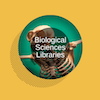About the BBS Dissertation Digital Collection
When our Natural Science students start their third year of study, some choose to take the Biological and Biomedical Sciences (BBS) course. Part of the assessment for this course is carrying out some form of research often as a dissertation. Many students find having the opportunity to see how other BBS students wrote up their dissertation to be really helpful which is why we have created the BBS Dissertation Digital Collection.
The BBS course is spread out across many different departments so we have grouped dissertations by subject for ease but some of them may cover more than one topic.
How does it work?
You can consult a list of current dissertation titles and then submit a request through our dedicated form. The Biological Sciences Libraries Team will provide you with access to the title(s) you require through Google Workspace for Education. You will be emailed a link to the dissertation which you will need to be logged in to Google with your Cambridge email address to access. If a link does not work, you may need to log out of any personal Google accounts.
The link you receive will provide view-only access with options such as copy-and-paste switched off. You will have access to the dissertation for seven calendar days after which access will be deactivated and you will need to put in a new request to continue your access.
Request a dissertation from the Collection
Make a note of the unique number and title of the dissertation(s) you wish to consult and submit your request through our dedicated online form. Please note that this service is staffed during standard working hours and any requests submitted over a weekend or during a bank holiday or related closure period will be processed on the next working day. Please note that we are aware of some emails getting caught by over-zealous spam filters, so do email us if you haven't received an email back from us within a reasonable timeframe.
Access to dissertations is given to help provide an idea of what approaches to writing up have been taken by former students. Any content provided within all dissertations belongs exclusively to the original author and is not to be replicated in any way unless the work has been referenced/cited in accordance with good academic practice.
The Collection
- #071 - Cellular Reprogramming as a Rejuvenative Therapy (2022/23)
- #083 - Can the male excess in autism diagnoses be explained exclusively by genetic factors? (2022/23)
- #085 - To what extent can variation in behavioural responses to novelty in non-human primates be explained by genetic factors? (2023/24)
- #097 - Can viral genomics predict host jumps? (2023/24)
- #042 - The history of polio eradication campaigns in Pakistan (2021/22)
- #077 - Defining depression: a deflationist account (2022/23)
- #043 - Is African Swine fever an unassailable challenge for the world’s pig production? (2021/22)
- #062 - “Man’s best medicine?” – the influence of animal exposure on the human gut microbiome and its role in the development of respiratory allergy (2022/23)
- #067 - Is the 2030 elimination goal of human deaths from canine-mediated rabies in Thailand and Tanzania feasible? (2022/23)
- #069 - Exploring the effect of biomolecular condensate dysregulation on Huntington’s disease (2022/23)
- #075 - The role of astrocytes in Alzheimer’s disease (2022/23)
- #081 - The prospects of antibiotics for treating inflammatory bowel disease (2022/23)
- #082 - How is deforestation affecting transmission of Yellow Fever virus in South America? (2022/23)
- #091 - How to eradicate a virus through vaccination (2023/24)
- #097 - Can viral genomics predict host jumps? (2023/24)
- #048 - How can knowledge of severe asthma endotypes influence selection and development of targeted pharmaceuticals? (2021/22)
- #049 - Metformin: a promising candidate for repurposing against indications beyond diabetes? (2021/22)
- #050 - Beyond the standard: what are the prospects of new classes of analgesics? (2021/22)
- #051 - Modulating the gut microbiota to treat obesity and type 2 diabetes, hype or hero? (2021/22)
- #052 - The mechanism of action of Clostridial neurotoxins (2021/22)
- #086 - Can PROTACs make the undruggable druggable, and what barriers need to be overcome to do so? (2023/24)
- #088 - What unique features and engineering may enable red blood cell therapy of cancer? (2023/24)
- #089 - How do we develop drugs for cancer prevention? (2023/24)
- #095 - Aptamers as therapeutic molecules (2023/24)
- #102 - The role of outer membrane receptors PhuR and HasR in iron acquisition in Pseudomonas aeruginosa and their future as drug targets (2023/24)
- #044 - Can the principles of organ development be harnessed for lab- or farm-based production of lungs for human clinical transplant? (2021/22)
- #045 - How Can a Mechanistic Understanding of Folate Action Improve the Prevention of Neural Tube Defects? (2021/22)
- #046 - The implication of ACE2 receptor expression in the cardiovascular effects of SARS-CoV-2 (2021/22)
- #047 - The neurobiological aspects of cancer and their potential for future therapy (2021/22)
- #057 - What are the major genetic and environmental factors contributing to the obesity crisis? How can knowledge of these factors improve our understanding of obesity and its treatment? (2021/22)
- #059 - What is the function of the tensor tympani muscle? (2022/23)
- #060 - The role of singing in protecting against Covid-19 symptoms (2022/23)
- #063 - How does spaceflight affect neurogenesis? (2022/23)
- #064 - Bodybuilding and mechanotransduction mechanisms (2022/23)
- #068 - The role of the cerebellum in cognition (2022/23)
- #072 - Targeting calcium channels in cancer (2022/23)
- #079 - The therapeutic potential of irisin to mitigate the risk of metabolic syndrome in postmenopausal women (2022/23)
- #084 - One-carbon metabolism in the peri-conceptional period and its impact on assisted reproductive technologies (2022/23)
- #094 - The neural correlates of the sense of direction in diverse species (2023/24)
- #096 - The neural circuitry behind dreams (2023/24)
- #099 - Insights into the psychological and neural mechanisms underlying current cognitive-behavioural therapies for treating psychiatric disorders (2023/24)
- #100 - How do complications of pregnancy affect future maternal health? (2023/24)
- #053 - Thinking with Feathers and Tentacles: Is Their Cognition Convergent? (2021/22)
- #054 - Are obsessions and compulsions in OCD the result of pervasive aberrant interoception? (2021/22)
- #055 - Making leaps and hitting boundaries in reconsolidation: overcoming boundary conditions to increase clinical translatability (2021/22)
- #056 - Do people get more conservative as they get older, or does the society around them just become more liberal? (2021/22)
- #066 - Are interventions for anxiety effective in autistic people? (2022/23)
- #073 - The impact of maternal immune activation on neural and cognitive development in offspring (2022/23)
- #074 - "You’re not autistic": exploration of the unique challenges faced by non-male autistic people and reflection on their causes and consequences (2022/23)
- #080 - Early life stress: a latent crisis in healthcare outcomes (2022/23)
- #087 - Has the extent of human irrationality been exaggerated in the application of psychology to change human behaviour and tackle policy challenges? (2023/24)
- #096 - The neural circuitry behind dreams (2023/24)
- #099 - Insights into the psychological and neural mechanisms underlying current cognitive-behavioural therapies for treating psychiatric disorders (2023/24)
- #058 - Interspecies hunting strategies (2021/22)
- #065 - How do the endocrine mechanisms of hosts influence the outcomes of brood parasitism? (2022/23)
- #070 - Can niche construction theory help us to understand equine domestication? (2022/23)
- #076 - How can the trophic rewilding of large terrestrial herbivores be used to mitigate climate change? (2022/23)
- #078 - What do we know about pre-Columbian human populations in the Amazon? (2022/23)
- #085 - To what extent can variation in behavioural responses to novelty in non-human primates be explained by genetic factors? (2023/24)
- #090 - To what extent is homosexual behaviour in animals an example of phenotypic plasticity? Viewing the current theories of homosexual behaviour in animals through a lens of phenotypic plasticity (2023/24)
- #092 - The evolution of same sex mating preference (2023/24)
- #093 - How can the conservation use of cattle impact biodiversity in the UK? (2023/24)
- #094 - The neural correlates of the sense of direction in diverse species (2023/24)
- #098 - Is the reintroduction of wolves (Canis lupus) and Eurasian lynx (Lynx lynx) to the British Isles a viable conservation strategy? (2023/24)
- #101 - The feasibility of current conservation plans in New Zealand and how they can be improved to maximise biodiversity (2023/24)
- #103 - The evolution of homosexual behaviour in mammals (2023/24)






